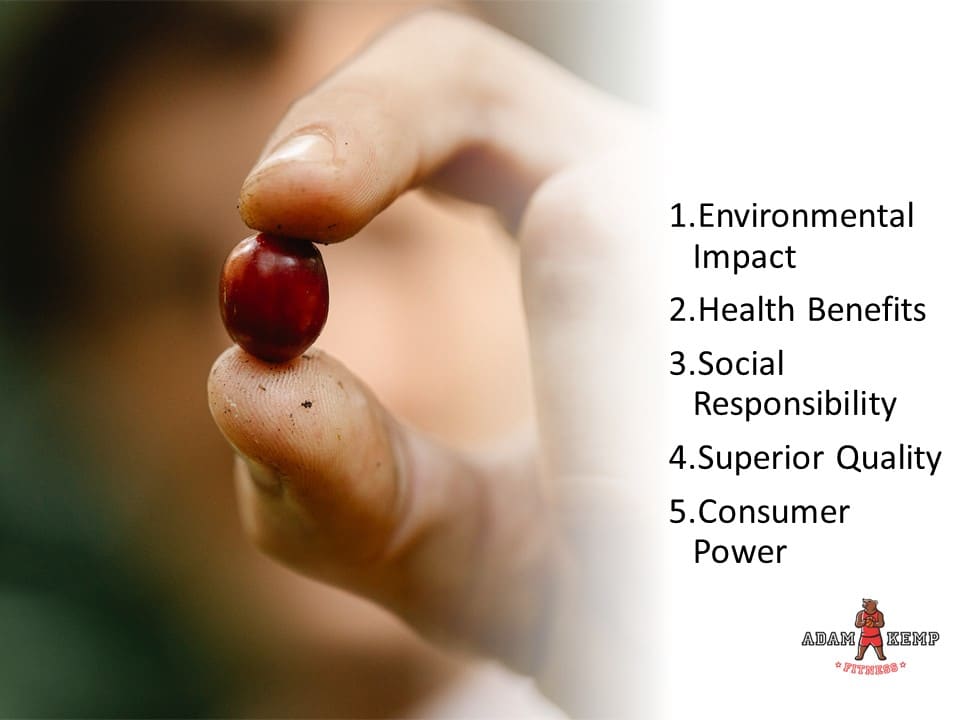The aroma of freshly brewed coffee is a universal start to the day for millions around the globe. As coffee has become so integrated into daily life, the industry has grown rapidly, making it a significant player in global agriculture.
Behind each cup lies a series of choices with wide-ranging implications for our health, environment, and social equity.
Understanding the differences in the types of coffee we consume beyond taste preferences reveals why organic and fair trade coffee offers a healthier, more sustainable, and ethical choice over conventional options.
1.) Environmental Benefits of Organic Farming
Opting for organic coffee farming brings significant environmental advantages that extend far beyond your morning cup.
By avoiding synthetic pesticides and fertilizers, organic practices preserve ecosystems, reduce pollution, and promote biodiversity.
Discover how these sustainable methods contribute to a healthier planet.
Lower Risks of Pesticide Exposure
Synthetic pesticides and fertilizers in conventional coffee farming have significant long-term environmental consequences.
These chemicals offer immediate pest control and soil fertility solutions but at a high cost.
They often kill non-target species, disrupt ecosystems, and leave residues in soil and water, threatening terrestrial and aquatic life (Pimentel et al., 2005).
Synthetic fertilizers also acidify soil and deplete essential nutrients, leading to soil erosion and reduced water retention.
In contrast, organic coffee farming uses natural alternatives like compost and cover crops to enrich the soil.
Biological pest control, such as introducing natural predators, manages pests without harming the environment.
These practices restore and preserve ecosystems, making organic coffee more sustainable.
Lower Levels of Soil and Water Pollution
Conventional coffee farming contributes to water pollution as rain washes synthetic pesticides and fertilizers into rivers and aquifers, creating “dead zones” with low oxygen levels that devastate aquatic life.
This affects human communities relying on these water sources and poses health risks, including reproductive issues and cancer.
Organic coffee farms reduce soil and water pollution through techniques like terracing and buffer strips to prevent erosion and runoff.
By using organic fertilizers and natural pest management, they significantly lower water contamination risks, maintaining healthy soil and water ecosystems.
Preservation of Local Biodiversity
Shade-grown organic coffee cultivation supports local biodiversity, providing habitats for various species, including birds and beneficial insects.
Unlike “sun coffee” farms that require deforestation, shade-grown coffee promotes sustainable practices and contributes to the preservation of ecosystems for future generations.
2.) Health Benefits of Organic Coffee
Choosing organic coffee offers numerous health benefits that go beyond its rich flavor.
By opting for organic coffee, you can avoid harmful pesticide residues, enjoy higher levels of antioxidants, and steer clear of genetically modified organisms (GMOs).
Let’s explore how these factors make organic coffee a healthier choice:
Lower Risks of Pesticide Exposure
Organic coffee significantly lowers the risk of pesticide exposure compared to conventional coffee.
Conventional farming employs synthetic pesticides that leave residues in the final product, posing health risks such as neurological issues, endocrine disruption, and increased cancer risk (Curl et al., 2003; Rauh et al., 2006; Gore et al., 2015).
Organic coffee avoids these risks by using natural alternatives like neem oil and biological pest control, offering a healthier choice.
Higher Antioxidant Content
Organic coffee contains higher levels of antioxidants, such as chlorogenic acid, than conventional coffee (Craig, 2009).
Antioxidants neutralize harmful free radicals, reducing the risk of chronic diseases like heart disease and cancer (Nimse & Pal, 2015).
The natural growing conditions of organic farms, with richer soils, enable coffee plants to produce more phytochemicals, enhancing the coffee’s health benefits.
Absence of Genetically Modified Organisms (GMOs)
Organic coffee is free from genetically modified organisms (GMOs), providing additional health assurance.
While GMOs are engineered for pest resistance and environmental stress tolerance, their long-term health effects remain uncertain.
Organic standards prohibit GMOs, making organic coffee a safer and more ethical choice for health-conscious consumers.
3.) Economic Benefits of Fair Trade Coffee
Choosing fair trade coffee offers more than just a delicious brew; it significantly impacts the economic stability and ethical treatment of coffee farmers.
By ensuring fair wages, funding community projects, and fostering sustainable development, fair trade coffee supports a more equitable and responsible supply chain.
Fair Wages and Ethical Treatment of Coffee Farmers
Fair trade coffee ensures fair wages for farmers by setting a minimum price per pound, providing a financial safety net and stability in volatile markets (Raynolds, 2009).
This enables farmers to plan for the future, invest in sustainable practices, and avoid exploitative labor.
Fair wages enhance farmers’ living standards, reducing the need for child labor and unfair wages, thus fostering an ethically responsible supply chain (Arnould et al., 2009).
Community Investment and Infrastructure Development
Fairtrade coffee includes a “social premium,” an extra amount paid on top of the fair trade price for community projects.
This investment funds essential infrastructure, such as schools, healthcare facilities, and renewable energy, in coffee-growing communities (Bacon, 2005).
Improved healthcare and education increase literacy rates and offer better future opportunities, breaking the cycle of poverty (Le Mare, 2008).
Higher Standards of Living for Farming Communities
Fair trade coffee’s economic benefits extend beyond wages and infrastructure.
Fair wages enable farmers to invest in their farms and families, fostering community development and creating a positive feedback loop for sustainable growth (Utting-Chamorro, 2005).
As a result, this leads to resilient, autonomous communities, reduced dependence on external aid, and unsustainable practices, and the guarantee that future generations inherit a stable, self-sufficient environment (Raynolds, 2002).
4.) Quality and Flavor
The quality and flavor of coffee are deeply influenced by how it is grown.
Organic and fair trade coffees stand out not only for their ethical production methods but also for their superior taste.
These coffees benefit from healthier, nutrient-rich soils, resulting in more complex and nuanced flavor profiles.
Taste Profiles
Organic and fair trade coffee are renowned for their superior taste, a result of the healthier, more fertile soil in which they are grown (Ponte, 2004).
Organic and fair trade coffee are renowned for their superior taste, a result of the healthier, more fertile soil in which they are grown (Ponte, 2004).
This soil quality produces coffee with nuanced flavors, ranging from subtle notes of fruits, spices, and flowers to distinct variations in acidity and body.
These rich profiles delight the palate and reflect the high quality achieved through sustainable and ethical farming practices.
Correlation Between Growing Conditions and Coffee Quality
Coffee quality encompasses flavor, aroma, acidity, body, and balance.
Organic and fair trade coffee sectors focus on maintaining healthy soil and balanced ecosystems, which enhance these characteristics.
Rich, nutrient-dense soil leads to thriving coffee plants that are less susceptible to diseases and pests.
This optimal development results in superior aroma and taste, making organic and fair trade coffee both an ethical and qualitative choice.
5.) Ethical Considerations: Role of Consumer Choices
Consumer choices significantly influence the coffee market, promoting sustainable and ethical practices.
By opting for organic and fair trade coffee, you signal to producers and retailers the value of ethically cultivated products.
This demand encourages other farmers and companies to adopt similar practices, amplifying the impact of each ethical purchase (Low & Davenport, 2005).
Impact on Child Labor and Forced Labor
Fair trade certification ensures that child labor and forced labor are excluded from the supply chain through stringent standards and regular audits.
Choosing fair trade coffee supports ethical labor practices and takes a stand against exploitation in the coffee industry.
Final Thoughts – Coffee Choices & Conscious Consumerism

Choosing organic and fair trade coffee is more than a preference for superior taste; it is a commitment to supporting ethical practices and environmental sustainability.
Each cup of coffee you consume has the potential to influence positive change, from promoting fair wages and better living conditions for farmers to preserving ecosystems and reducing pollution.
By making informed choices, you contribute to a more equitable and sustainable coffee industry.
Your decisions can drive demand for ethically produced coffee, encouraging more farmers and companies to adopt sustainable practices.
Your decisions can drive demand for ethically produced coffee, encouraging more farmers and companies to adopt sustainable practices. In the end, you will help create a global coffee market that values human rights and environmental health.
As a conscious consumer, your coffee choices reflect your values and priorities.
Opting for organic and fair trade coffee supports a system that benefits people and the planet, ensuring that your enjoyment of this beloved beverage also makes a positive impact on the world.


Leave a Reply